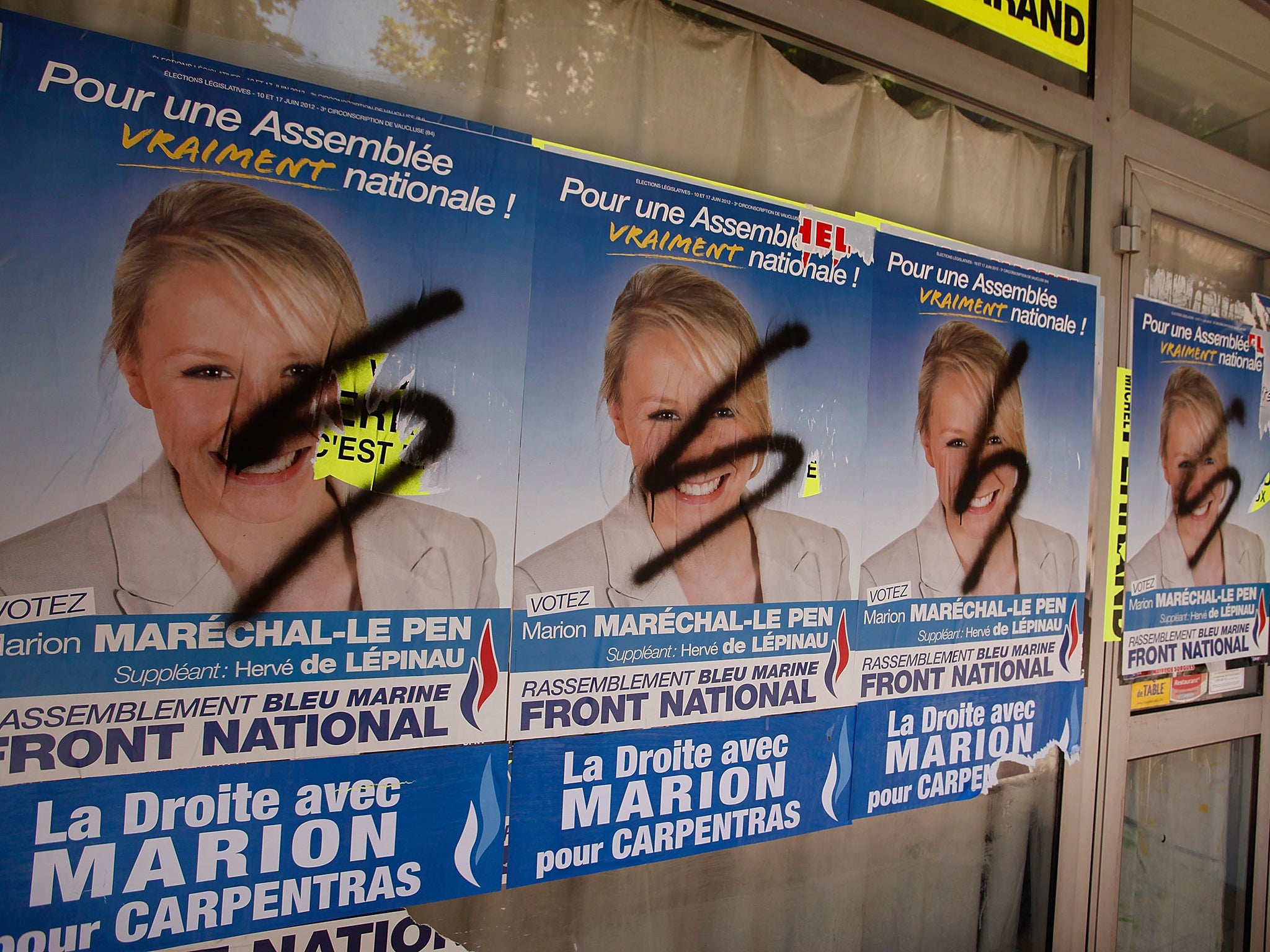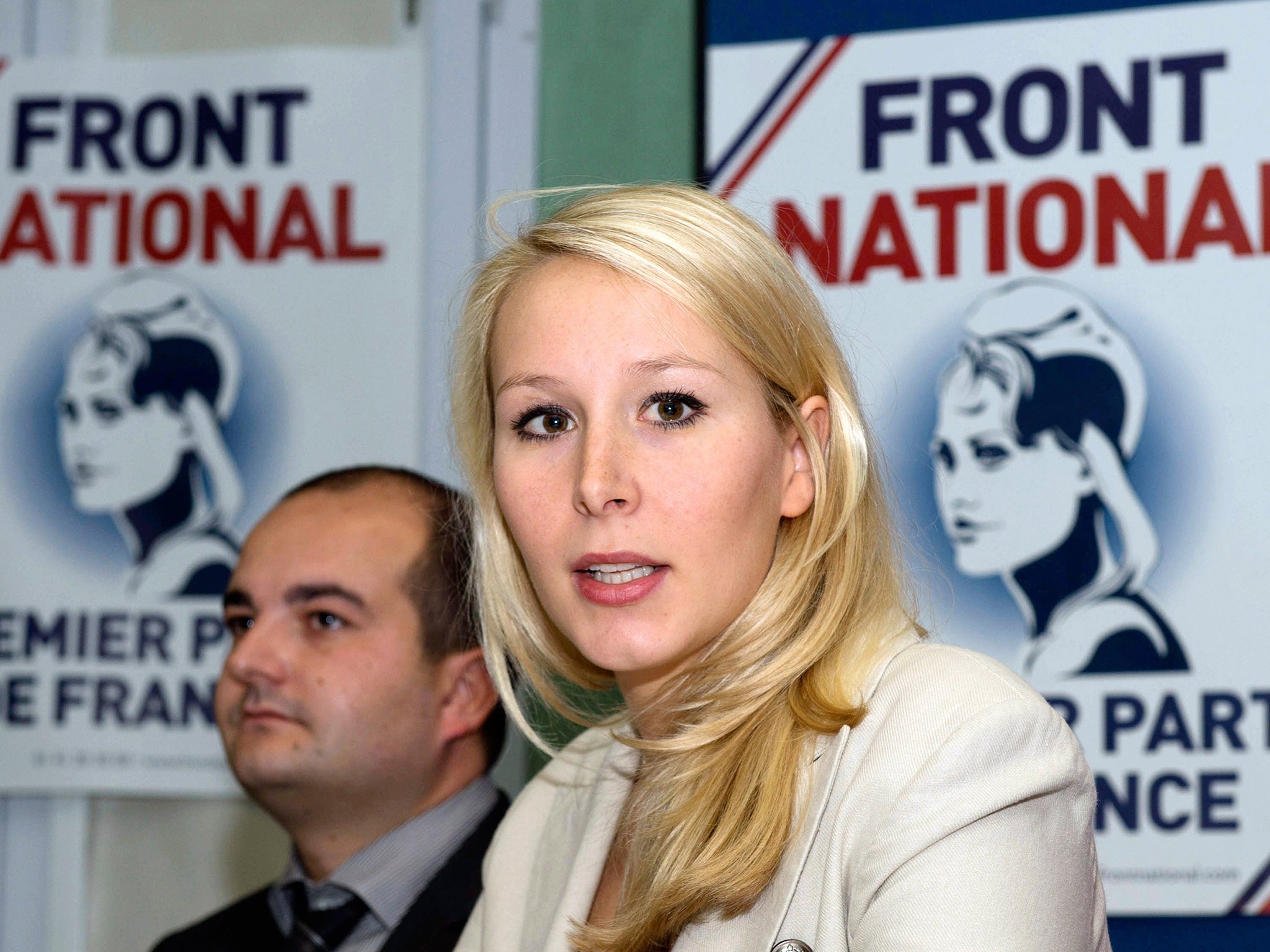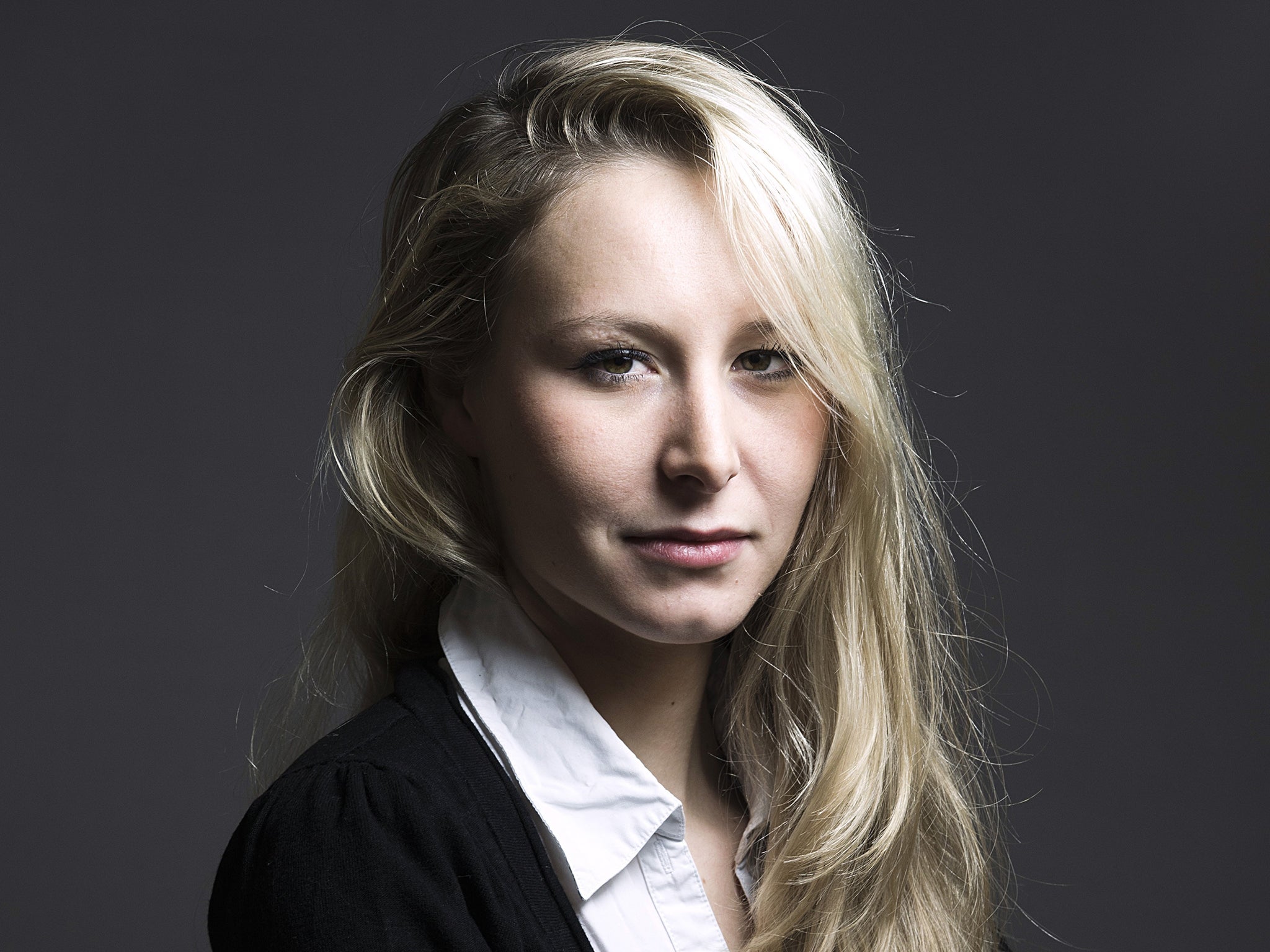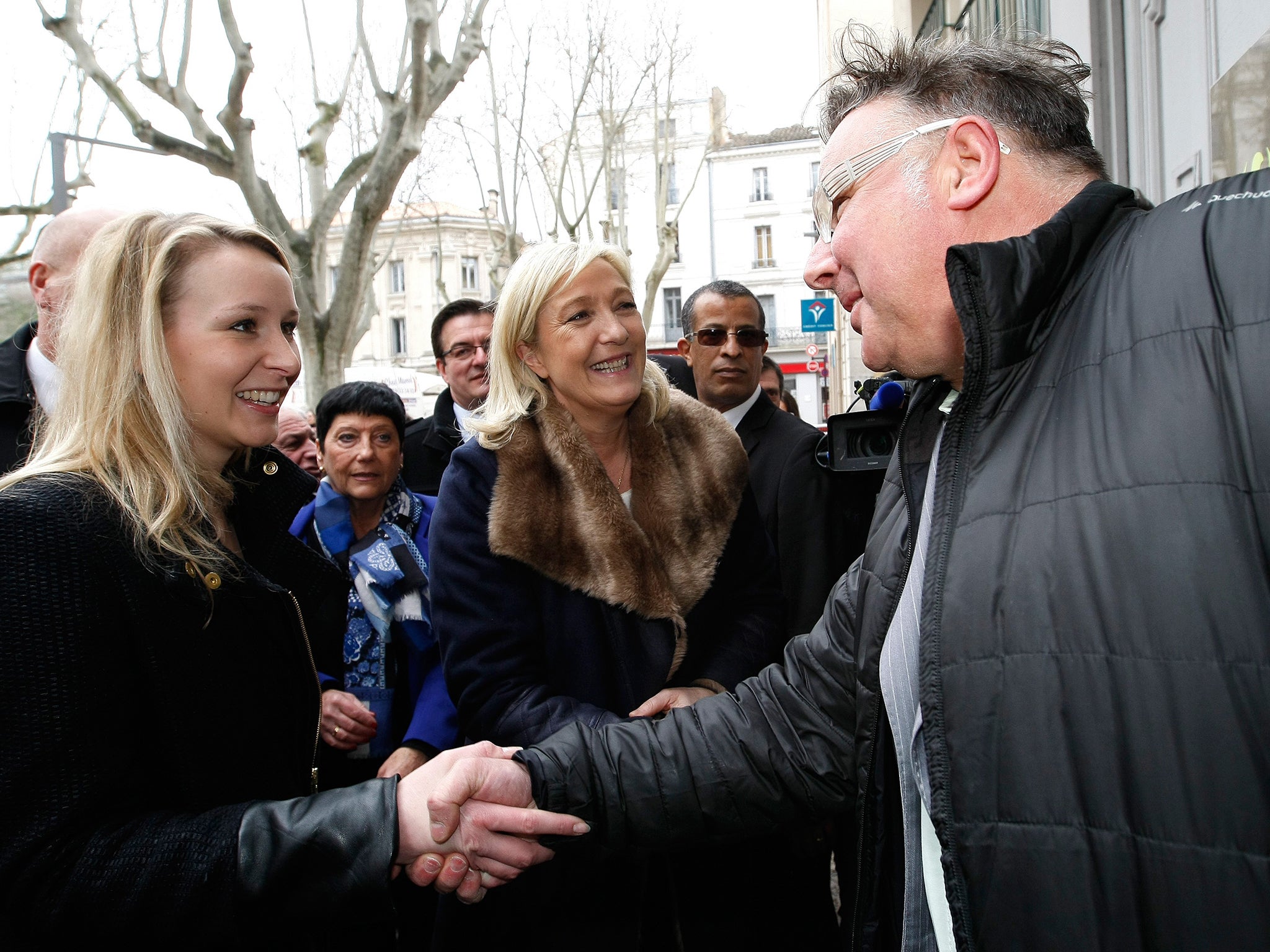Marion Maréchal-Le Pen: The poster-girl of the French far-right is more extreme than her aunt and bigger box office than her grandfather
As France goes to the polls, Marine Le Pen's party, the Front National, looks set to do well. And key to that rise has been Le Pen's fiery niece Marion, the FN's rising star. John Lichfield meets her on the stump and asks if she is more than a marionette

Your support helps us to tell the story
From reproductive rights to climate change to Big Tech, The Independent is on the ground when the story is developing. Whether it's investigating the financials of Elon Musk's pro-Trump PAC or producing our latest documentary, 'The A Word', which shines a light on the American women fighting for reproductive rights, we know how important it is to parse out the facts from the messaging.
At such a critical moment in US history, we need reporters on the ground. Your donation allows us to keep sending journalists to speak to both sides of the story.
The Independent is trusted by Americans across the entire political spectrum. And unlike many other quality news outlets, we choose not to lock Americans out of our reporting and analysis with paywalls. We believe quality journalism should be available to everyone, paid for by those who can afford it.
Your support makes all the difference.A young woman, tall, slender and blonde, greets market-goers in the pretty town of Bollène in the Rhône valley. She wears smart black trousers and a black woollen jacket with big zips on the pockets. She is friendly but shy – not yet a polished, political back-slapper or hand-shaker. She has been a French MP for three years. She is 25.
Most of the shoppers are polite. A few are enthusiastic. Some are passionately hostile. "Say hello to your granddad, the torturer, for me," hisses a tall, pale woman in her fifties. "People who ignore their history are condemned to relive it. No more fascism in France."
Marion Maréchal-Le Pen, granddaughter of Jean-Marie and niece of Marine, looks wounded and then moves on. Just like her aunt, Marine, the most scary thing about Marion Maréchal-Le Pen is that she is not obviously scary.
That was never true of her granddad, the now semi-retired founder and patriarch of the Front National (FN). The "torturer" jibe was a reference to the fact that Mr Le Pen once admitted torturing prisoners during the Algerian war of independence from France. He later retracted the statement.
Marion used to be dismissed within the FN as a marionette – the French word for puppet. In the run up to local elections this weekend, in which the far right is expected to make sweeping gains, the puppet appears to have cut its strings.
France's youngest-ever MP went toe-to-toe in parliament last week with the feisty Socialist prime minister, Manuel Valls. Amongst other things, she called him a "cretin".
Reports suggest that her newfound aggression is driven by the desire to become a standard-bearer for a harder line within the FN – closer to the views of her unreconstructed grandfather than the deodorised brand of extreme nationalism marketed with great success by her aunt Marine during the last four years. Meeting her now, Marion adamantly denies these reports. Some of her comments appear, nonetheless, to confirm them.
On the entrance wall of Marion's constituency office in Carpentras, near Avignon, in the Alpine foothills, there is poster from the early 1990s that shows Jean-Marie Le Pen holding a pretty blonde toddler. The child has the same fine features and the same piercing, slightly crossed brown eyes as Marion.
"Yes, that is me in the picture," Marion says. She appears a tinge embarrassed, as if unwilling to be typecast as a hereditary princess of the far right – the third generation of a Le Pen political dynasty.
Marion Maréchal-Le Pen is the daughter of Yann Le Pen, the second of Jean-Marie's three daughters. Her parents separated when she was a child and she was brought up by her mother in the family's manor house in a Paris suburb, where her aunt Marine also lived.
It was revealed in 2013 that her nominal father, Samuel Maréchal, a former FN politician who became a businessman, was not her natural father. Marion qualified as lawyer after she was elected in 2012 but is now a full-time politician. She married last year and has a baby girl, Olympe.
Marion refuses to accept the terms "far right" or "extreme" to describe her party or her own views. She prefers "nationalist right" or "patriotic" or just "right wing". To use the word "cretin" for the Prime Minister during parliamentary question time is, however, not the language of mainstream politics. Is Marion's, calm, unscary exterior, a cloak for islamophobic extremism? "First of all, I didn't call Valls a cretin. I said that he had a 'cretinous scorn' for our voters – and even then I was quoting someone else," she says. "It was Valls who insulted me. He said that the FN had been going through the bottom of dustbins looking for racist candidates. He said that he had no problem stigmatising the FN and no problem stigmatising me.
"Going through the bottom of dustbins! How dare he? We are not racists or extremists in the Front National. We are people who love our country. We are people who want to save France, which has been consistently betrayed by people like Valls. The polls show 30 per cent of voters are now willing to vote for us. How can one in three French voters be an extreme?"
In fact, it was not Valls who accused the FN of searching dustbins for racists to run in this month's local elections. It was the Socialist Party's first secretary, Jean-Christophe Cambadélis. And didn't he have a point? One local NF candidate in Aveyron, in south-central France, called on his Facebook page for the "destruction of the Jews once and for all". Another candidate in Ardèche, in the Rhône Valley, posted a swastika and the message: "Marine, you are the reincarnation of Hitler. You are going to clean up France."
Marion shrugs. "We have 7,640 candidates in these elections. We have had problems with 11 of them. There are always a few idiots who get through all the filters. All have been excluded."

Marion's performance in parliament against Valls certainly endeared her to the foot soldiers of the party. "She is the same age as my own kids and I admit I was once doubtful about her," says Georges Michel, a retired army officer who is a local FN candidate Bollene. "Against Valls the other day, she proved to me that she is a man. How many 25-year-olds could stand up and do that? To me, she represents the cream of French youth."
This all lends credence to the rumour that Marion has a strategy to establish a hard-line power base within the FN, closer to her grandfather's approach. But "all this is nonsense", she says. "Of course, everyone has a slightly different viewpoint. We are a democratic party. Of course, I love my grandfather. But Marine is in command now. I have no sense that anything I have ever done or said has been contrary to Marine's direction for the party."
Despite her denials, however, Marion has emerged in recent months as a political force in her own right. In November, she came top in the elections for the FN central committee. She even scored better than Marine's right-hand man and deodoriser-in- chief, Florian Philippot – and if relations between Marion and Philippot are said to be poor, relations between Philippot and Jean-Marie Le Pen are known to be miserable.
It is no secret that Jean-Marie Le Pen and his daughter have quarrelled about aspects of her "de-demonisation" of the FN. Jean-Marie, one gathers, sees nothing wrong in being demonic. Marine recently described her relationship with her father as "like the weather in Brittany. The sun breaks out several times a day". Marion, NF watchers suggest, is loyal to her aunt but sounds more and more like her grandfather. "Every time she speaks now, she tries to provoke, to shock, to make waves," one party official says.
Is this part of a strategy? Officials close to Marine have hinted to the French press that Marion is "naive" and being "used" – without saying precisely who is using her. But by way of illustration, Marine has been very careful, post-Charlie Hebdo, to avoid the "racist" label by attacking "Islamism", rather than Islam. Not Marion. She tweeted her support for a FN European MP who had been slapped down by Marine for talking of a "third column" of a million radical Muslims in France.
Challenged on this, Marion says that it did not amount to taking a harder line than her aunt. "No one is attacking Islam as such," she says. "We accept that there is a large French‑born Islamic population in France who have a right to be here. The FN is not a racist or Islamophobic party".
However, unprompted, she then sets off further down the road of Islam-baiting than Marine usually ventures.
"It is wrong to say that here we have a problem with just a small minority of jihadists," she continues. "The leadership of Islam in France, the Conseil Français du Culte Musulman, speaks moderately in public but it is aligned with the Muslim Brotherhood, which is an Islamist movement. Who knows what they are saying in private?"
This is potentially explosive – and quite wrong. The French Muslim Council has 44 elected representatives. Two of them belong to a Muslim union which is linked to the Muslim Brotherhood. The overwhelming majority, 39, belong to organisations which believe in a "moderate Islam, respectful of the laws of the Republic".

Can one say the same of the FN? When Marine Le Pen talked to The Independent five years ago, she was asked which side she would have taken in 1940: Charles de Gaulle's Free French or Philippe Pétain's collaborationist Vichy government? Marine knew it was a trick question: there was a great deal of Vichy sympathising DNA in the FN that her father founded in the 1970s. She paused for a couple of seconds, then said that, "as a natural rebel", she would have been on the side of de Gaulle.
Asked the same question now, Marion replies, "de Gaulle, of course. But 70 years later, it is too easy for people to say they would have been on the side of the Resistance. The choices at the time were not so simple. In any case, there were far more collaborators on the left than on the right".
Spot the difference. Marion's reply – including the dubious claim about collaborators on the left – is closer to what Jean-Marie might have said than words Marine might have spoken.
The division within the FN – between the admirers of the founder and those of his daughter – is regional as well as ideological. Born in the south, the party was once fiercely anti-state, anti-tax and anti-Communist; as well-as anti-Semitic, anti-immigrant and anti-European. The FN now preaches state planning, high taxes on big business, a higher minimum wage and some degree of nationalisation. (It also promises, simultaneously, high spending and low taxes; more state and less state.)
However, while the quasi-socialist economic policies of the "Mariniste" FN appeal to the party's newfound blue-collar voters in the rust-belts of the north and north-east, the traditional southern bastions of the FN – in an arc from the Rhône Valley to the Côte d'Azur – remain faithful to the party's poujadiste, anti-state origins.
Marion, party insiders say, is being groomed by her grandfather as a standard-bearer for this "southern" faction within the FN. She, however, denies that there is, in effect, a Front du Nord and Front du Sud: "It is true that, in the south, most of our new voters are people who have usually voted right, and that many of our new voters in the north are people who have previously voted to the left," she says. "But our economic policies are popular with voters right across the country."

But aren't they incoherent? True, France is in a mess because for three decades the right wing has governed on the left and the left has governed on the right. But the NF programme amounts to saying that France can be governed from the left and right at the same time. It rejects the need for any structural reforms to allow France to compete in a new globalised world.
Like Ukip, the NF promises to leave the EU, but for different reasons (apart from immigration): Ukip believes the EU is too statist and interfering; the FN says Brussels is too laissez-faire and obsessed with competition. However, outside the EU, the FN says, France would thrive behind an economic Maginot Line.
"Times have changed and our policies have changed," Marion says. "In my grandfather's time, the FN was founded largely as an anti-Communist party. Now we face the destruction of our economy by the obsession of Brussels with free competition. Every country in the world protects its economy except the EU. We would restore economic sovereignty and decision-making to France. We would protect strategic industries and we would protect vital areas such as the energy sector. But we would not cut ourselves from the world. There could still be trade."
And the consequences? Does she not fear a Europe 10 or 20 or 30 years from now, in which all the old nationalist jealousy and hatred have been re-ignited? Look at what is already happening in Vladimir Putin's Russia (a generous supplier of loans to the FN).
"All my life, from my cradle onward, I have heard that argument," Marion says. "That nationalism is also Nazism, that if you defend your national interests you are starting an infernal process that leads to war and calamity. That has always been the magic potion that other parties used against us. Now the magic does not work any more."
It is certainly true that, after four decades of economic disappointment and botched reform, France has lost faith in its mainstream parties of left and right. Marine's moderate extremism threatens to tear up the political map of France. The far right will almost certainly top the county-council poll nationally this weekend. And yet the polls also suggest there is an unbreachable bloc of around 60 per cent of French voters who will never vote Front National. Marine seems guaranteed to reach the two-candidate second round in the 2017 presidential election. She seems equally certain to lose the run-off.
Marion refuses to accept this arithmetic. Can her aunt win in 2017?
"Yes, she can win. I don't say that she will win but she can win. The economy might improve, The left could recover. The left and centre-right might form an alliance. But, as things stand, yes, there could be a President Marine Le Pen in 2017."
Join our commenting forum
Join thought-provoking conversations, follow other Independent readers and see their replies
Comments